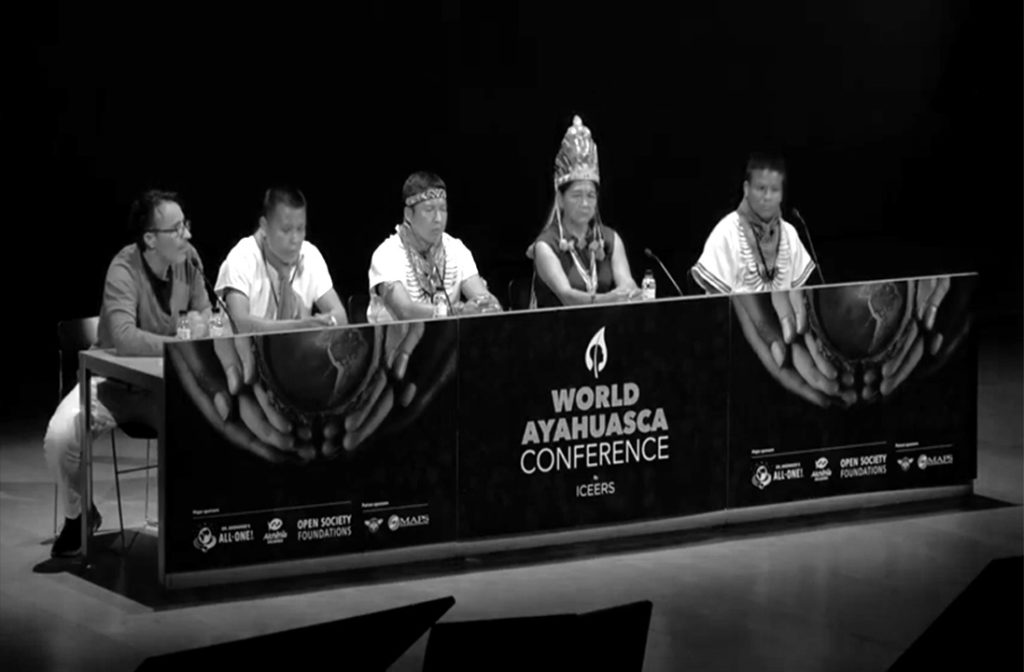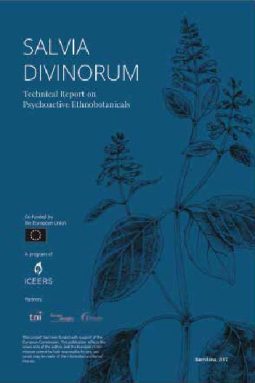At the 2019 World Ayahuasca Conference, the Union of Indigenous Yagé Medics of the Colombian Amazon (UMIYAC) presented a panel on the topic of what yagé and spirituality means to the Amazonian indigenous people of Colombia. Presenters included Ernesto Evanjuanoy Chindoy, Miguel Evanjuanoy Chindoy, Gemilton Jojoa Yocuro and Rubiela Mojomboy Jojoa.
UMIYAC is an indigenous organization that was established in 1999 that includes five indigenous groups from the Colombian Amazon rainforest and works to preserve the Amazon rainforest and to revitalize and protect their cultures and ancestral medicine.
Moderator, Riccardo Vitale introduced the panel with an emphatic statement. “We’re not here to give a presentation,” he said. “We are here to build movements. We are part of a long path.”
UMIYAC and indigenous resistance
Vitale began by sharing a story. In 1998, an indigenous leader from the U’wa people acted as spokesman in a very difficult struggle with an oil multinational that wanted to drill in their territories. The U’wa people rose up and threatened to carry out a collective suicide, as they had in 1700 when the invaders had expelled them from their territories. This threatened the reputation of the oil company, that then withdrew from the project. It was a landmark moment in the indigenous resistant movement in Colombia.
“We are also here for Francia Márquez,” said Riccardo Vitale. Márquez was winner of the Goldman Prize in 2018. Two weeks before the conference, she suffered an attack on her life. She is one of many indigenous leaders who have had their lives threatened or who have been killed.
As of June 2019, 60 human rights defenders died this year in Colombia. In 2018, 164 people were killed advocating for a new model of development. Since the signing of the peace agreements, more than 600 people have died. These figures vary depending on where you get the information, but the point is that they indicate a terrible situation. The clash in Colombia is between models of development, the government-imposed model is not in alignment with a different vision of sustainability. There are movements around the world that speak to this clash.
Healing collective trauma
Every year 240,000 hectares of forest are lost in the Amazon and with the forest we are also losing the wisdom and knowledges that are key to responding to the challenges that have been created in the Anthropocene.
“We have come from our territories to share, and to convey a message of partnership between all of us to save the planet. Let’s protect Mother Nature.” said UMIYAC’s president Ernesto Evanjuanoy Chindoy. According to Ernesto Evanjuanoy, it is thanks to the medicine of yagé (ayahuasca) that their communities are able to heal. He spoke to how hard it is to watch how human beings are harming Mother Earth and not seeing the consequences for future generations.
Ernesto highlighted the need to build alliances so as to strengthen territories. The spirits of the plants and those around it are suffering, he said. Species are disappearing. Therefore, they cry out with pain to the divine spirit to turn back around this loss. There is much work still needed to stop the suffering and the violence in the Amazon, the place that is the lungs of the world.
Rubiela Mojomboy Jojoa, UMIYAC member, spoke to the danger of extinction that the original indigenous nations of the Amazon are facing. UMIYAC is an organization that allows indigenous peoples to be united and to safeguard their ancient ancestral territories.
She spoke about the impact of colonization over hundreds of years and how today, it the attempt to take lands and resources is disguised through “free, prior and informed consent” processes. The Colombian government has negotiated with other countries to sell the “wealth,” the resources of indigenous territories, and communities across the country are resisting.
Human rights
“We are going to defend our rights and the rights of our nations. Our human rights matter,” she said.
Gemilton Jojoa Yocuro, member of UMIYAC, began his contribution by asking permission from the ancestors and spirits listening from his territories. Our peoples, he shared, have lived within these territories for millennia and respect is an important principle – respect for everything, for all life. To him the job of indigenous people has been to project nature – the air, the water, not just for themselves but for the whole world.
What is left at this moment in time, he said, is to share with the world that it is unclear what will happen with the planet. “It is clear to us,” he said, “that spirituality has fed us. We are here to tell the world that we need these spirits and hearts to build alliances to protect what we have protected for thousands of years.”
Gemilton Jojoa Yocura called for the creation of spiritual alliances to continue the struggle to protect Mother Earth. Yagé, he said, is something that cannot be understood and that must be protected. He himself has been drinking since he was 8 years old and still does not understand the wisdom of yagé. “We have to preserve yagé,” he said, speaking to the importance of being respectful of how this medicine is taken as its use spreads around the world.
The role of UMIYAC
As the final speaker, Miguel Evanjuanoy Chindoy added to the dialogue by sharing more information about UMIYAC. The five peoples that are a part of UMIYAC – the Inga, Siona, Cofán, Koreguaje, and Kamsä Bia – are in danger of extinction – this has been acknowledged by the Colombian constitutional court. “We are threatened, at risk of physical and cultural extermination,” he said.
In Colombia there are 102 indigenous peoples, 64 of them in the Amazon. Our peoples are very concerned, he shared. They have faced genocide for the last 500 years since colonization. It’s only recently that indigenous peoples have been recognized as humans in the constitution.
“We are here in pain, we are suffering,” said Miguel Evanjuanoy Chindoy. The governments have an interest in plundering the wealth of our territories, but not in contributing to the welfare of indigenous peoples.
“The Amazon is a living library. We are the guardians of Mother Nature,” he concluded.
Categories:
NEWS
Tags:
ayahuasca
, Amazon
, indigenous cultures
, World Ayahuasca Conference


